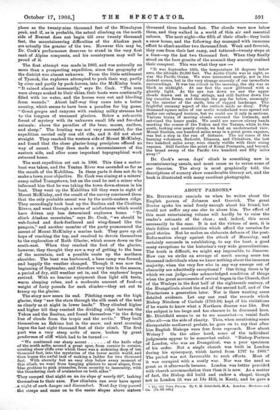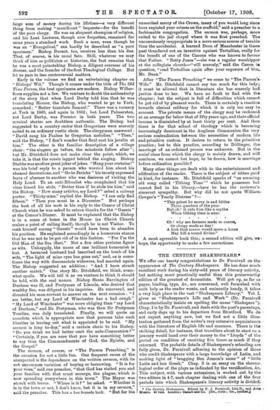ABOUT PARSONS.*
MR. DITCHFIELD reminds us when he writes about the English parson of Johnson and Garrick. The great Doctor spoke his mind freely enough about his friend, but would not suffer any one else to abuse him. The effect of this most entertaining volume will hardly be to raise the reader's estimate of the class ; and, indeed, this must necessarily be the case. It is not the virtues of men, it is their follies and eccentricities which afford the occasion for good stories. But he makes an elaborate defence of the post. Reformation clergy against the attack of Macaulay, and certainly succeeds in establishing, to say the least, a good many exceptions to the historian's very wide generalisations. The truth is difficult, we might say impossible, to discover. How can we strike an average of merit among some ten thousand individuals when we know nothing about the immense majority, when the very few who in any way emerge out of obscurity are admittedly exceptional ? One thing there is by which we can judge,—the acknowledged condition of things when the great movements of revival began in the Church, that of the Wesleys in the first half of the eighteenth century, of the Evangelicals about the end of the second half, and of the Tractarians a generation later. Nor is there wanting some detailed evidence. Let any one read the records which Bishop Nicolson of Carlisle (1703-18) kept of his visitations if be wants to know what a Northern diocese was like. But the subject is too large and too obscure to be discussed here. Mr. Ditchfield seems to us to err somewhat—a venial fault after all—on the side of charity. Thus, when mentioning some disreputable mediaeval prelate, he goes on to say that after him English Bishops were free from reproach. How about Wolsey ? On the other hand, some of the individual judgments appear to be somewhat unfair. "Bishop Porteus of London, who was an Evangelical, was a poor specimen of his order. Not a single church was built in London during his episcopacy, which lasted from 1787 to 1808." The period was not favourable to such efforts. Most of it was occupied with a costly war. Nor was the need so great as it afterwards became. London was better provided with church accommodation then than it is now. As a matter of fact, the Bishop did build and endow a chapel, though not in London (it was at Ide Hill, in Kent), and he gave a • The Ohl TL7114 Tars,n. By P. IL flitcifieU, N.A. Loudon: Methuen and Co. [7x. 6d. net.]
large sum of money during his lifetime—a very different thing from making " munificent " bequests—for the benefit of the poor clergy. He was an eloquent champion of religion, and his Lent Lectures, though now forgotten, remained for some years a standard work. Such a man, even though he was an "Evangelical," can hardly be described as "a poor specimen." Bishop Burnet, too, receives less than his due. That, of course, is his usual fate. Still, whatever we may think of him as politician or historian, the fact remains that he was a most painstaking Bishop, a diligent overseer of his diocese, and the founder of the first Theological College. But let us pass to less controversial matters.
Early in the volume we find an entertaining chapter on "Bishops' Wit." Though it comes under the title of The Old Time Parson, the best specimens are modern. Bishop Wilber- force supplies not a few. We venture to doubt the authenticity of the story that when Lord Derby told him that he was translating Homer, the Bishop, who wanted to go to York, remarked : "Better translate Samuel." There was a vacancy at York in 1860, and again in 1862; but Lord Palmerston, not Lord Derby, was Premier in both years. The two musical stories are doubtless authentic. The Bishop had suggested to a country rector that Gregorians were scarcely suited to an ordinary rustic choir. The clergyman answered : "David sang his Psalms to Gregorian melodies." "Then," said the Bishop, "I don't wonder that Saul cast his javelin at him." The other is the familiar description of a village choir: "the singers go before, the minstrels follow after "; but Mr. Ditehfield does not make clear the point, which, we take it, is that the music lagged behind the singing. Bishop Stubbs was another great joker of jokes. "Hang your curtains!" was his brief reply to a parson who worried him about his chancel decorations, and "Go to Jericho" his tersely expressed leave of •absence to another who was desirous of visiting the Holy Land. To an anti-Ritualist who complained that his vicar kissed his stole, "Better than if he stole his kiss," said the Bishop. " How many articles, my Lord P" asked a railway porter. "Thirty-nine," replied the Bishop. "I can only find fifteen." "Then you must be a Dissenter." But perhaps the best of all his mots is his reply to the Censor of Christ Church when he was asked to return thanks for the " Guests " at the Censor's Dinner. It must be explained that the Bishop is in a sense at home in the House (as Christ Church makes a point of calling itself), though he is not Visitor. To rank himself among " Guests " would have been to abandon his position. He explained accordingly in a humorous stanza that he was not to be got rid of in this fashion. "For I'm the Old Man of the Sea (See)." Not a few other prelates figure as wits. Unhappily, the name of one brilliant humourist is lost. A bereaved husband had inscribed on the tomb of his wife, "The light of mine eyes has gone out," and, as is some- times the way with disconsolate widowers, had married again. The Bishop suggested an addition : "And I have struck another match." One story Mr. Ditchfield, we think, some- what spoils. We will tell it as we venture to think it should be told, with the real names. Bishop Shute Barrington of Durham was ill, and Pretyman of Lincoln, who desired that wealthy See, was diligent in his inquiries. He recovered, and directed his man-servant to answer on the next occasion : "I am better, but my Lord of Winchester has a bad cough." "My Lord of Winchester" was more obliging than "my Lord of Durham," and Dr. Pretyman, who was then Sir Pretyman Tomlins, was duly translated. Finally, we will quote an anecdote which is appropriate now that parsons take such liberties in leaving out what is appointed to be said. "My sermon is long to-day," said a certain cleric to his Bishop. "Do you think we had better omit the ante-Communion ? " "Certainly, if you are sure that you have something better to say than the Commandments of God, the Epistle, and the Gospel." The sermon, of course, or "The Parson Preaching," is the occasion for not a little fun. One frequent cause of the unexpected is the dependence on the written sermon, with its not uncommon variation of buying or borrowing. "It is for your vices," said one preacher, "that God has visited you and your families with that cruel scourge, the plague, which is now spreading everywhere in this town." The Mayor was struck with terror. "Where is it?" he asked. "Whether it is in the town or not, I don't know, but it is in my sermon," said the preacher. This has a ben trovato look. "Bat for the unmerited mercy of the Crown, many of you would long since have expiated your crimes on the scaffold," said a preacher to a.
fashionable congregation. The sermon was, perhaps, more
suited to the jail chapel where it was first preached. The unconsciously inappropriate is a more serious source of trouble- than the accidental. A learned Dean of Manchester in times past thundered out an invective against Tertullian, really for- the benefit of one of the Canons who was known to favour - that Father. "Betty Jones "—she was a regular worshipper- at the collegiate church—" will scarcely," said the Canon in
question, "read Tertullian again after your exposure of him,_ Mr. Dean."
After "The Parson Preaching" we come to "The Parson's- Wife." Mr. Ditchfield cannot say too much for this lady;. it must be allowed that in literature she has scarcely had justice done to her. We have no fault to find with the • chapter; but the subject is full of difficulties which cannot be got rid of by pleasant words. There is certainly a reaction towards clerical celibacy for which it is only too easy to-- account. The private means of the clergy may be reckoned at an average far below that of fifty years ago, and their official income is diminished by at least thirty per cent. And then there is for that school of theology which is becoming- increasingly dominant in the Anglican Communion the very serious contradiction between the necessities of modern life. and primitive custom. It desires to return to the primitive practice ; but to this practice, according to Dollinger, the.
marriage of an ordained person was unknown. But in the' social class from which the clergy is mainly drawn, and will continue, we cannot but hope, to be drawn, how is marriage' before ordination possible ?
Many other things are dealt with to the entertainment andl edification of the reader. There is the subject of tithes paid' in kind, for instance. Mr. Ditchfield speaks of "an amusing- old song called Tithing Time'" which he possesses but- cannot find in his library,—here he has the reviewer's sincerest sympathy. But why did he not quote WilliamA Cowper's "Yearly Distress" ?—
" This priest he merry is and blithe Three quarters of the year.
But oh ! it cuts him like a scythe When tithing time is near.
• .... • . • Oh! why are farmers made so coarse, Or clergy made so fine !
A kick that scarce would move a horse May kill a sound divine."
A most agreeable book this; a second edition will give, we, hope, the opportunity to make a few corrections.















































 Previous page
Previous page